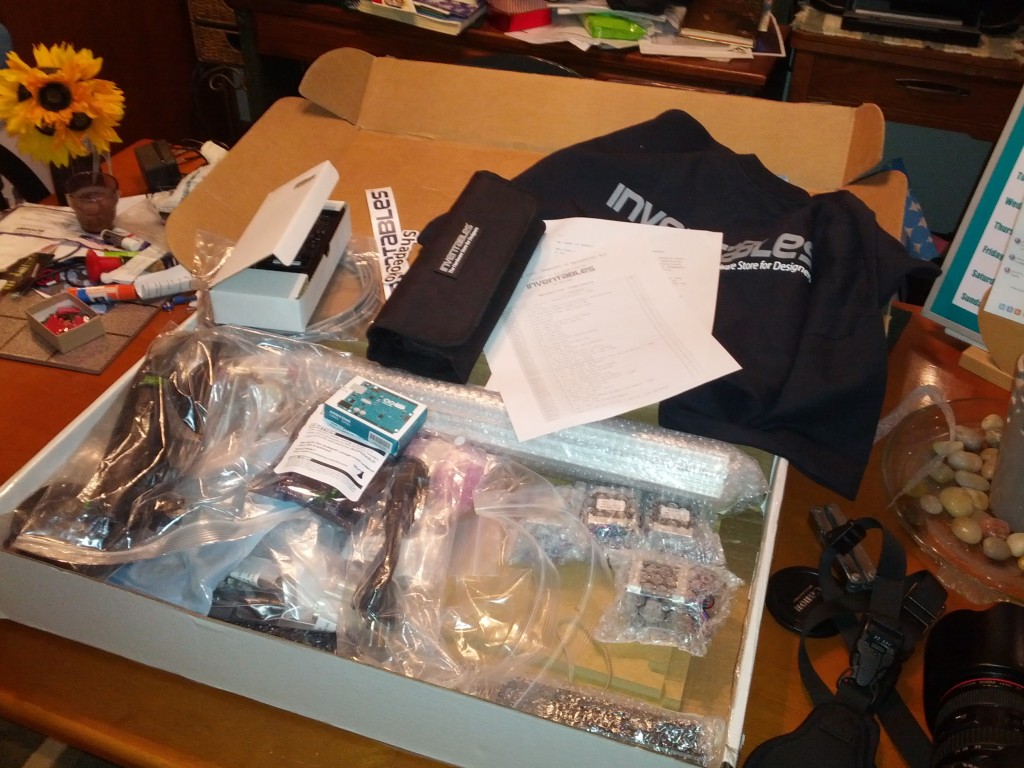After the wires were made, I connected all the motors in a not so pretty fashion. I hooked up the Arduino and GRBL Shield and tied in the stepper leads. I opened up the Universal G-Code Sender and tested my motors. Everything seems to be working. I spent a bit of time trying to read about G-Code, but it reads like stereo instructions. It is important to know, but not something you can just sit down and read and somehow retain. It takes association and I have not had any. So, I read over getting my GRBL shield configured. When everything looked right, I decided it was time to let er rip. Feeling good about how things were going, I attached a sharpie to a wood block which was then attached to the Shapeoko. I started jogging the head over to where I planned to call the world “0”. It does not move very fast as each click on an axis equals 1 mm of travel. So, I decided I did not want to wait forever, so I tried 20 mm per click. This worked much better as I could click the buttons a few times and scoot it to where I wanted it to start fairly quickly. The Z was too high, so I pressed the Z- button a few times as I had done with the X and Y.
This was a mistake. The Z axis (up and down of the head) only needed to go perhaps 25 mm. The brain starts to work amazingly quickly in a moment of perceived emergency. I sat there in awe, amazement, horror as I watched the Shapeoko lower my sharpie down to the surface. I wanted it to stop, it felt it should keep going. You know the saying “garbage in garbage out”, well the result of my garbage out consisted of watching the beautiful sharp point of the sharpie squish itself flat and up into the pen. But it did not stop there, oh no. 3 clicks? I had essentially told it to lower 60 mm. It then occurred to me that I had not read anywhere in the instructions about what to do if/when the system goes silly on you. Not sure what to do, I grabbed the end of the sharpie and pulled it sideways so it would not damage the work surface, or the gantry head, or or or (I do not know what this thing is capable of, and did not want to find out). I tried pressing cancel in the program, then I realized that this will do no good as the program only sends a command to the controller, it can not make it stop until the current command is finished. My only options left were the Arduino and the controller. Kill the controller, remove what it needs to survive!!! I pulled the power and the chaos stopped. I can not tell you exactly how long all this took, I just know that it was over and done quickly. Note to self…
Having just learned (by the process of natural correction), Z-axis, gets lowered slowly. Small increments. Do not rush. I regained my calm and found another good sharpie and strapped it on. I clicked the send button in the UGS (Universal G-Code Sender program) and the machine took off into the design. Here is learning moment #2. In the chaos of the previous situation, I forgot to reset the zero point. So, the head took off towards the other side of the machine, raising the head back up into the air. There is something hypnotic about watching it move. It is enjoyable and the sound is somewhat dub step in nature. I knew what I had not done and due to the previous event, I knew that I had to pull the power… AGAIN. Grrr.
I got the machine back to where I wanted it to start. New Sharpie was ready and waiting. I took a moment to go through all the various settings and made sure all was well with the world. This is probably a good idea in general. I sent the file and the machine sprang into action. It started drawing the Hello World like a champ. This time I could just sit and watch and enjoy the thing. It was great. I noticed that as it got to the end the pen lost contact with the paper. I could see that the paper was floated a little bit above the surface.
Here is a video of the drawing of the Shapeoko 2 logo. Now, with the back story, you understand where the marker streak towards the middle of the paper came from.

